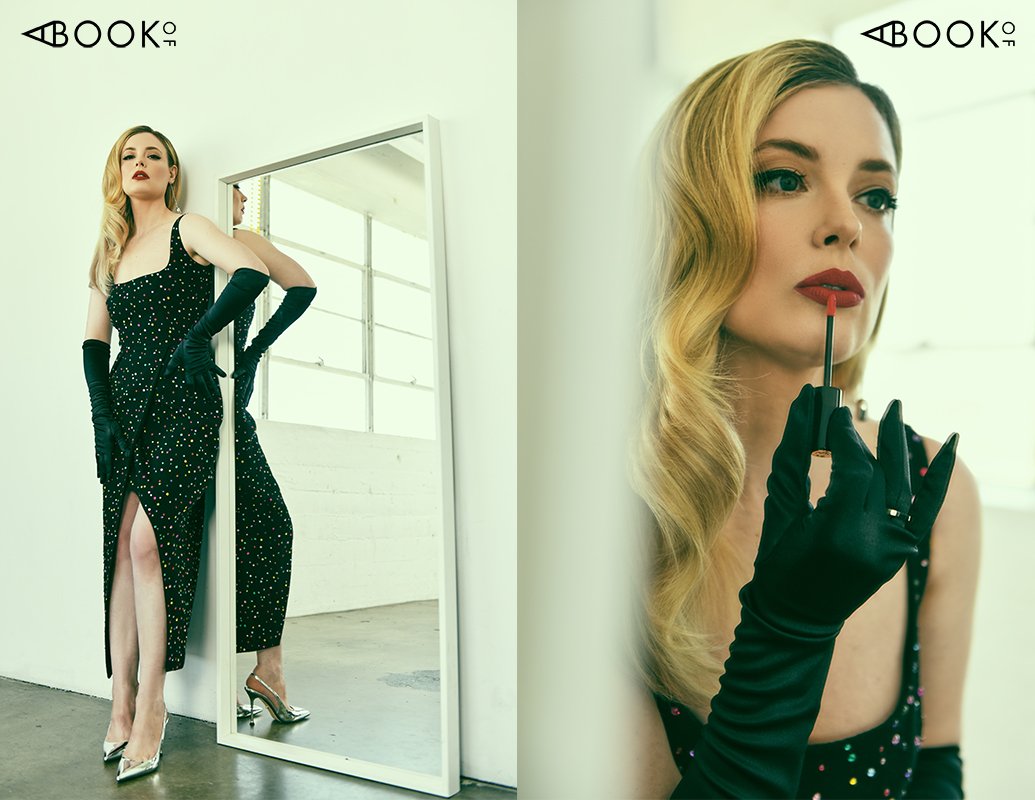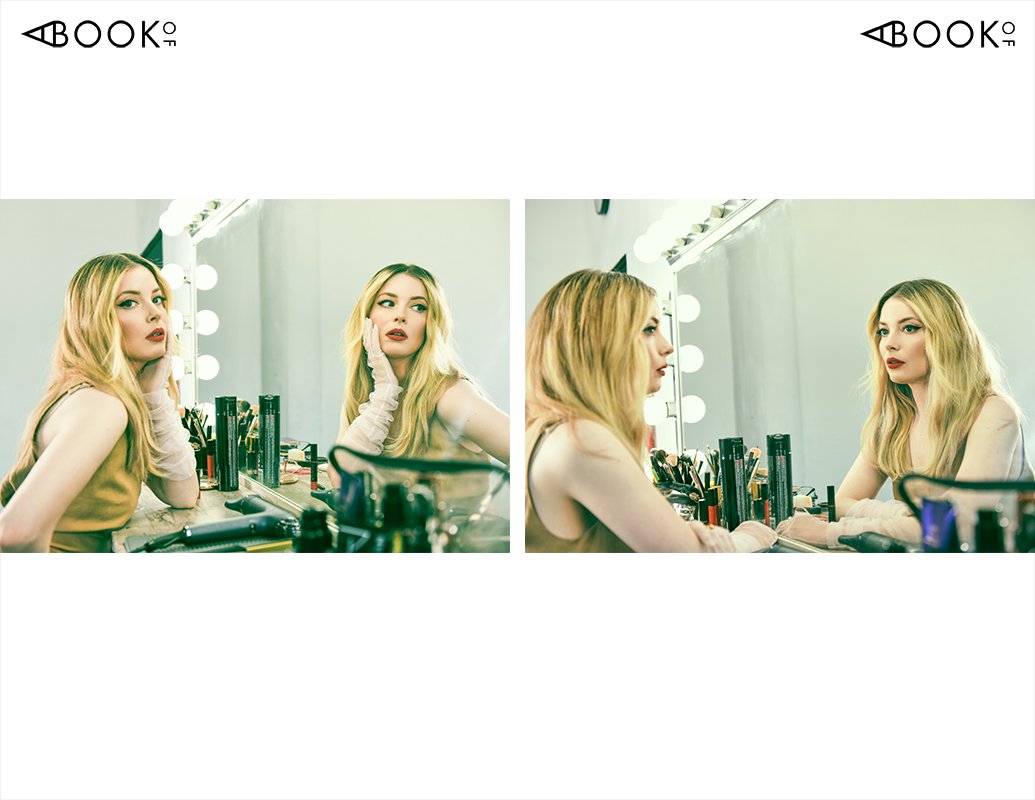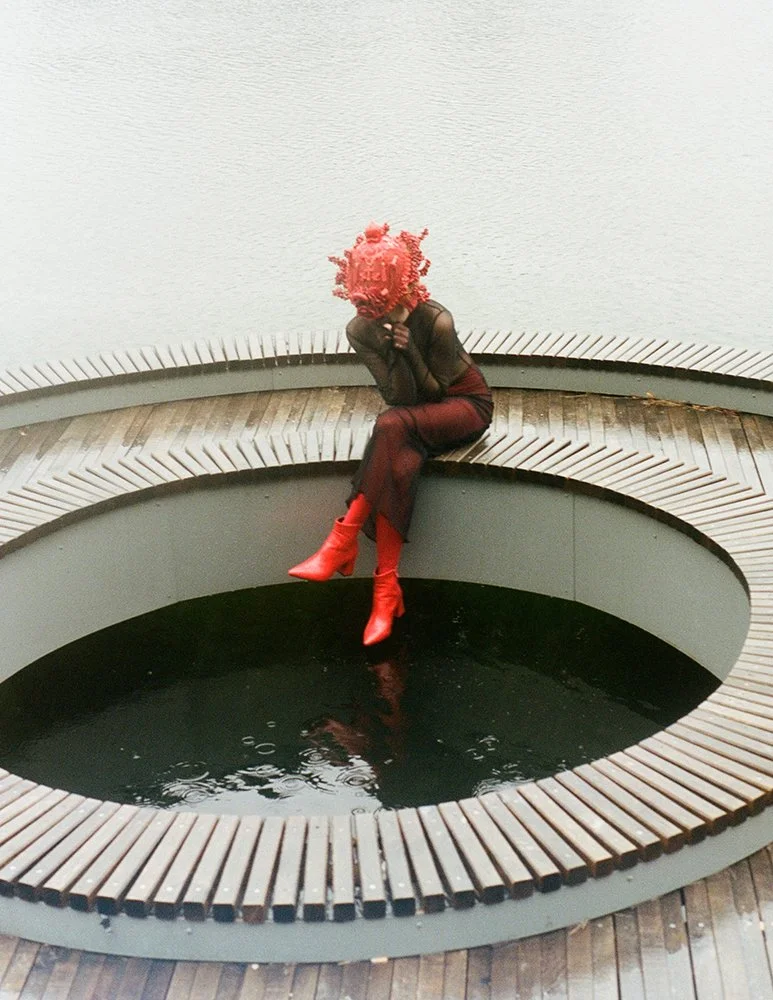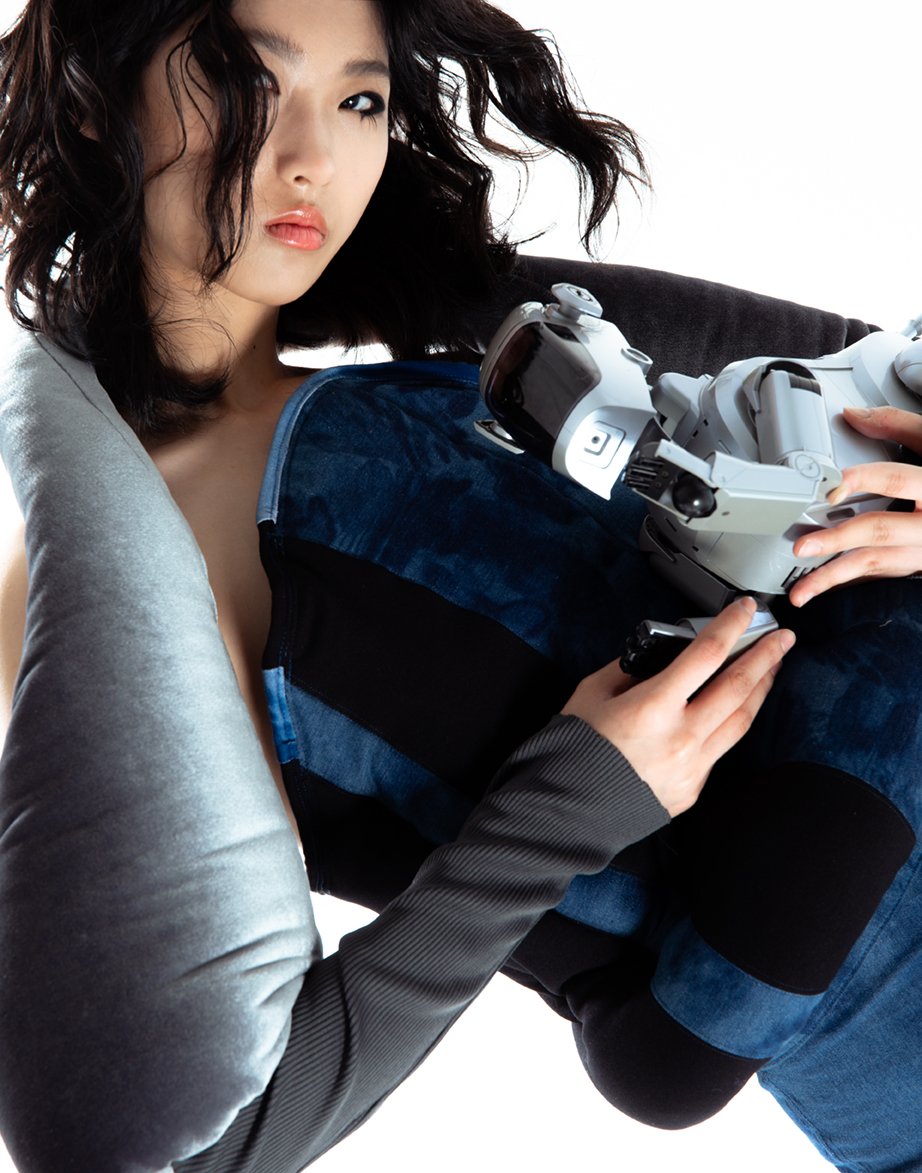BENDING GENRES WITH GILLIAN JACOBS
BY MEG MCCARTHY
PHOTOGRAPHER: IRVIN RIVERA, PRODUCER: LOUISE BARRETTO, FASHION DIRECTOR: ANDREW PHILIP NGUYEN, MAKE-UP: STEPHEN SOLLITTO @TMG LA, HAIR: BRIAN FISHER @ A-FRAME AGENCY, PHOTO ASST: KEVIN YIU
In this exclusive interview, Meg McCarthy sat down with Gillian Jacobs (Transatlantic, Community) to talk about how she got her start, how she found her voice, and what she's up to now. From working on six seasons of Community, which is known for its genre-bending and intrepid approach to comedy, to her time at Julliard, where she first experienced the effects of comedy on her audience, Gillian has come a long way and is always looking for new challenges. Will she find her way back to the stage? Is there more directing in her future? Scroll down to find out more.
Dress: ONG OAJ PAIRAM, Earrings: MING YU WANG
Do you remember the first moment you fell in love with acting-or got that pull that just wouldn’t let go, the need to pursue a creative life?
Apparently, I didn’t have any friends and was talking to myself on the playground at recess, and my teachers were concerned and called my mother and said you need to find her some extracurricular activities, so she can hopefully make some friends. She [my mother] felt like I was dramatic in my reactions to things and thought I might enjoy acting, so she signed me up for an acting class, and it was immediate love. It was the first time I was exposed to an acting class. I feel in love.
You found your people.
Oh, yeah. And I did make friends with kids from all over the city, not just my school district. I made a lot of friends who lived all over. I waited all week for Saturday, when I could go to acting class, I just loved it so much. I got the chance to perform in a lot of plays growing up and work with adult professional actors, which I thought was the coolest thing in the whole world. I just wanted to do it as much as I possibly could.
Dress: ONG OAJ PAIRAM, Earrings: MING YU WANG, Heels: ALEVI
Shoutout to your mom for noticing that.
Shout out to my mom—absolutely! Since then, she’s told me that she had dreams of becoming an actor when she was a kid, so she got to give that to me. She gave me so much opportunity, but she never pushed it beyond what my interests were. I remember her driving me to and from rehearsal after working a full-time job and being so exhausted. I know now, as an adult, how tired she must have been. She always went the extra mile to make sure that I could do what I loved.
That’s lovely. And then you went to the prestigious Juilliard School. What is something you’ve learned to love about your talent that perhaps was a contention at school?
Well, I never knew that I was funny at all or that I had any kind of aptitude for comedy. I remember, I think my sophomore year, I brought in a scene by Christopher Durang, one of my favorite playwrights. I really made my classmates laugh and they were the most enthusiastic I had ever seen them about one of my performances. Like, it really seemed like they loved it. And I remember the teacher—rather than going like, okay, we've found something here that you really are good at, let's nurture it—she said, well, you can clearly do that and never bring in anything like that ever again. [She] never really encouraged me to pursue it or [thought] that it was something worth pursuing or [that it] was a good thing to be funny. So it was kind of a big, full-circle moment for me when I was cast on Community because it was something I had never really pursued in the way that a lot of people I knew ended up going to Upright Citizens Brigade, Second City, or iO or taking improv or sketch classes. I didn't do that. It wasn’t until I was cast in Community that I realized it was actually something that was a skill that I liked about myself, that I valued and other people valued it.
LEFT Dress: ONG OAJ PAIRAM, Earrings: MING YU WANG, Heels: ALEVI RIGHT Top: CHRISTINE ALCALAY
That's so wild to me because, to be a great actor, you're representing the human experience, and laughter is so essential to that. There's nothing better than hearing laughter in an audience, like, isn't that the best feeling?
Oh, my gosh. Yes. I haven't done plays or live performances since I graduated school, but yes, any time I get to do that, it is a whole other level of relationship with the audience and a different type of performing. You're making me itchy to do a live performance again.
You'd be so brilliant in theater.
Thank you. That's so kind of you to say.
Top: CHRISTINE ALCALAY
I want to talk about genre because you're so brilliant at blending genres, and when I think of Community, that was one of the first shows that really played with genre in an innovative way. How did that inform your view on genre moving forward?
It set the bar really high for me in terms of it was a show that certainly had a loyal audience when it was airing, but was not a breakthrough success. We were sort of fighting for renewal every year, and now it's this kind of wild experience of this much larger group of people discovering it on streaming platforms and coming to it anew. And I feel like there is an appreciation for everything you just described about what the show was and what it did. I recognized early on that I was very lucky to be a part of that show for not only the writing, but also the cast. I had the opportunity to learn so much from my castmates; it made me want to work on things—not necessarily just do comedy, but do things that I felt were challenging to me in the same ways that role was because I came in with less experience in comedy than other people in the cast. I was constantly learning. I guess I’m always looking to replicate that feeling of doing something new, doing something different, challenging myself in different ways.
Dress: PEGGY HARTANTO
It did feel like a huge playground to experiment, and I think that's why all of us young creatives at the time were so obsessed with the show from the beginning because we were envious of that type of artistry. It was really freeing to watch.
And it was freeing performance-wise. I know I've said this in the past, but it's really true, that the cast was so supportive of each other, kind of what acting school was supposed to be in terms of making big choices—maybe it'll work, maybe it won't. I think we all found each other genuinely funny and were sort of delighted by what each other was doing. It encouraged all of us to make bold choices and take big swings and feel that kind of creative freedom that you're talking about.
Absolutely. And to see all of you in that cast go off and do so many different artistic endeavors in different genres and different mediums is testament to that as well, to that support. It's very cool.
Yeah. I'm so proud of everyone.
LEFT Jumpsuit: BEBE, Jewelry: LILOU RIGHT Top: CHRISTINE ALCALAY
Obviously, we don’t know much about Community: The Movie, but has Britta been sitting with you since you last wrapped the series?
Not consciously. I think she's somewhere there, partly with me all the time, especially when I make any kind of small mistake—people love to point out that I've “Britted it.” So, in that way, it's a constant presence. But in terms of the actual performance, I have not really thought about it. We got to do a Zoom reunion a few years ago and read an episode all together. That was really fun and it felt like everybody fell back into it very quickly. That was the first time we'd all sort of like played those parts again together, which was surreal, but also kind of strange because we're all standing in front of our laptops separately, we're all boxes on a screen. I think it'll be fun to actually be physically in the same room doing a scene together.
Most recently, you starred in Netflix’s Transatlantic (inspired by the real events of a rescue mission to get thousands of artists, intellectuals, and refugees out of Nazi-occupied France.) Did stepping into Mary Jayne’s shoes, although you’re playing a fictionalized version of her, impact your perception on the history of filmmaking and the weight of storytelling as a tool for change especially during turbulent times?
It's an interesting thing. Whenever you're doing a fictionalized version, you want to do as much research as you can about the real people and the real events, but then also give yourself over to the story that you're telling, that the show’s showrunner and creator, Anna Winger, has crafted. I tried to find that balance between doing research, learning what I can, and then just kind of giving yourself over to it. But that was an amazing experience; I’m so lucky that I got to be a part of it.
Dress: ONG OAJ PAIRAM
Let’s talk about The Bear, because—talk about genres—that show makes us laugh and cry, creating a space for those two things to coexist in such a raw and human way. It’s really reflective of your career as well, being able to gift audiences with those simultaneously.
That’s very meaningful. Thank you for saying that. What a supreme privilege to be a part of that show. I think one of my highlights at Julliard was when I was a freshman, [and] we did a production of a Stephen Adly Guirgis play called In Arabia, We'd All Be Kings. That was my first introduction to writing that felt kind of like a cousin to The Bear. I remember being a freshman and going, “I want to be in one of his plays one day.” And then a few years after graduating, I actually got to be in one of his plays. And not only that, but it was directed by Philip Seymour Hoffman and starred Michael Shannon and Ellen Burstyn. The reason I'm bringing this up is Liza Colon-Zayas was in it, who is also on The Bear. It was such an incredible experience on that play—what you're talking about laughing and crying—deeply human and hilarious. So I feel like that was a real high-water mark for me as an actor of what I wanted to be doing, what felt exciting and new and different for me.
You know, I was a kid who was obsessed with Shakespeare. I would make my family go to the George Bernard Shaw Festival in Canada every year. I knew a lot more, I think, about classical theater than I did about contemporary playwrights and I just found that whole experience to be so thrilling and exciting. That is the same feeling that I had working on The Bear, where it was just everybody operating at the very highest levels. Everybody is so excited to be there, so excited to work hard. For me, as heavy as the “Fishes” episode was, I haven't had that much fun on set in I can't tell you how long. It was a really beautiful thing, and the fact that Liza is part of The Bear, and I’ve gotten to reunite with her at parties and things and see her again just feels like a very full-circle thing once again for me.
That's beautiful. This is why I think you need to do theater again. Theater has always been a place to explore that raw human experience, a place to mix genres. We’re getting more of that essence in film and television with shows like The Bear. It shouldn't even be in a genre category because it's in a category of its own. It's just life. I think that's why so many people gravitate toward it so much. It’s also heavy on the dialogue, which is very Shaespearian.
It was so much fun. You're so right. I’ve always heard from acting teachers and directors about, like Chekhov, where you're laughing one minute and crying the next, and that Chekhov considered them comedies, and that a lot of people read them as these, like humorless, serious plays. But I think he saw them in that way- Exactly what we're talking about. It's so fun because it is so life. My experience of life is the funniest moments right up next to the really hard ones.
I hope that we get more of Tiffany. Also, side note, kudos because gosh, we've seen so many nasty portrayals of ex-wives on screen and it’s so important to humanize portrayals.
Ebon [Moss-Bachrach] was such a lovely scene partner. Another full-circle moment: Ebon and I were on Girls at the same time, I for much more briefly than he was. We were in one scene together, but we didn't share any dialogue. He and I both kind of started our careers in New York, and it was really fun to get to work with somebody that I already felt like I had that kind of shared history [with].
Dress: ONG OAJ PAIRAM, Jewelry: LILOU
I want to switch again to another genre that you've done a lot of work in, which is voiceover work. In your opinion, what are some of the biggest misconceptions about voiceover work?
I had an instinct that I would like it. I consciously asked to start auditioning for animated shows. I don’t know why I had that instinct, but it just looked like fun play—like when you're talking about what the best acting class is supposed to be—that kind of free play. Imagination. No rules. No boundaries. No having to match continuity. None of that. It's also challenging, performance-wise, to put everything into your voice, and you start to realize how much you rely on your physicality, your face, all these things as an actor. They’re adding their artistry to that in terms of the storytelling and your character, but from your end, all you can really contribute is your voice. I really enjoyed the challenge of that, the pure freedom of being in a booth and just doing whatever comes to mind. Then of course they can rein you back. And it's something I like to watch. I used to watch a lot of animated shows growing up, and I watched Adult Swim, when I was in college, animated shows aimed toward adults. It’s something I appreciated because I was a viewer. I've gotten to play Harley Quinn in two things for DC, and that was so cool because I used to watch Batman cartoons when I was a kid. What an iconic character. [It’s] not often you get to do those characters that a lot of people have done over the years, like Margot Robbie and Lady Gaga, whether it's animated or on camera.
I'm curious, consciously or not, do you think your voiceover work has affected how you approach your on-camera work?
I hope so. I had this prop in my left hand and I put it down on this line, and, you know, my eyeline is there. There are so many other technical things that come into play when you're on camera that can feel like they're restrictive, but it's also the challenge of how do you find the freedom within all those restrictions, right? Sometimes that can be really freeing, too. It's like, nope, I have to do this, this, and this, but between those things, I can still try something very different each take. I guess that's the goal, to have that sense of spontaneity within the confines of the technicalities of doing stuff on camera.
You’ve also directed—do you want to direct more? Anything in the works?
Yes! Nothing I could say now, but yes, I've continued to develop things for me to direct primarily in the documentary space. Since the last documentary that I directed, I guest reported an episode of this podcast, 99% Invisible, which was really fun. Between doing interviews for documentaries and kind of doing guest reporting stuff, that's been a whole other challenge to me, and I've really enjoyed that a lot. I ask a lot of questions just in my day-to-day life, which may annoy my friends, but then it's put to good use when you're directing a documentary or reporting something.
Dress: ONG OAJ PAIRAM
I totally get that. I feel like I’m asking questions all day and then, on top of that, it’s what I do for a living. I'm like, do I ever stop just talking and asking questions?
I mean, you learn a lot when you're curious about people, you hear a lot of amazing stories.
Absolutely. Before I let you go, it’s a A Book Of tradition to ask if you were a book, what book would you be and why?
Harriet the Spy, which was one of my favorite books when I was a kid. As we’re talking about my endless question asking and my curiosity, hopefully I’m not spying on people in the way that she was, but I hope it’s that spirit that I fell in love with when I was a kid. Staying open has stayed with me, so yeah, I would probably be Harriet the Spy.






















